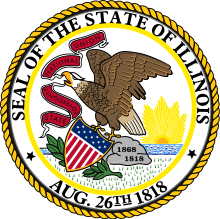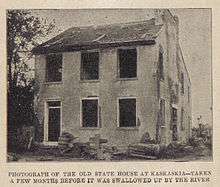1st Illinois General Assembly
The 1st Illinois General Assembly, consisting of the Illinois Senate and the Illinois House of Representatives, met from October 4, 1818, to March 31, 1819, during the first two years of Shadrach Bond's governorship, at The Kaskaskia State House. The apportionment of seats in the House of Representatives was based on the provisions of the First Illinois Constitution. Political parties were not established in the State at the time.
1st Illinois General Assembly | |
|---|---|
 | |
| Type | |
| Type | |
| Houses | Senate House of Representatives |
| Leadership | |
President of the Senate | Pierre Menard, Independent |
Speaker of the House of Representatives | John Messinger, Independent |
| Seats | 14 Senators 29 Representatives |
| Meeting place | |
 | |
| Kaskaskia, Illinois | |
It was succeeded by the 2nd Illinois General Assembly.
Members
This list is arranged by chamber, then by county. Senators and Representatives were both allotted to counties roughly by population and elected at-large within their districts. Two counties shared one senator.
Senate
- Martin Jones
- Joseph Kitchell
- Guy W. Smith
- Michael Jones
- Thomas Roberts
- Alexander Jamison
- Lewis Barker
- John McFerron, resigned July 8, 1819
- Zariah Maddux
- Willis Hargrave
House of Representatives
- Francis Kirkpatrick
- David Porter
- Scott Riggs
- Levi Compton
- Henry Utter
- Elijah Ewing
- John G. Daimwood
- Adolphus F. Hubbard
- John Marshall, resigned
- Jesse Griggs
- Isaac D. Wilcox
- John Howard
- Abraham Prickett
- Samuel Whiteside
- William Alexander
- Green B. Field
- Robert Hamilton
- John Messinger
- Risdon Moore
- James D. Thomas
- Edward Humphreys
- Samuel Walker
- Jesse Echols
- John Whitaker
- Daniel S. Swearengen
- William McHenry
- William Nash
- Alexander Phillips
Employees
Senate
- Secretary: William C. Greenup
- Doorkeeper: Ezra Owen
House of Representatives
- Clerk: Thomas Reynolds
- Enrolling and Engrossing Clerk: Timothy Davis
- Assistant Enrolling and Engrossing Clerk: Milton Ladd
- Doorkeeper: Charles McNabb
gollark: 42% of our DNA is retrotransposons, which aren't actually viruses but vaguely related.
gollark: It's definitely one of those sentences.
gollark: But I don't think that's actually the case, and evolution doesn't always do the globally optimal thing.
gollark: If there were no interactions between host-killing-ness and everything else, it would probably be optimal for a virus to do no damage to its hosts.
gollark: It doesn't matter if the host dies if they've already done their spreading.
See also
References
This article is issued from Wikipedia. The text is licensed under Creative Commons - Attribution - Sharealike. Additional terms may apply for the media files.